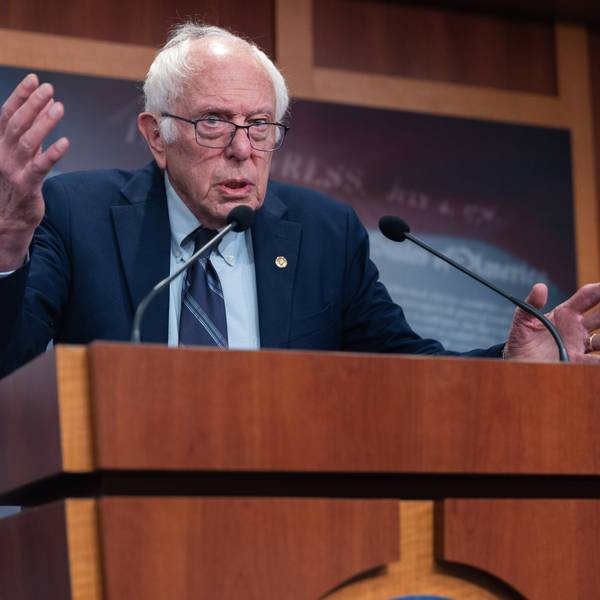
U.S. Sen. Bernie Sanders (I-Vt.) speaks at a press conference at the U.S. Capitol on November 19, 2024 in Washington, D.C.
Sanders Rips Lawmakers Saying 'We Don't Have the Money' While Backing $900 Billion for Military
"I think it's time to tell the military-industrial complex they cannot get everything they want," said Sen. Bernie Sanders. "It's time to pay attention to the needs of working families."
U.S. Sen. Bernie Sanders on Monday derided those of his colleagues who claim it's too expensive for the federal government to take ambitious action on national crises in housing and healthcare while simultaneously supporting a military budget that's approaching $1 trillion a year.
"I find it amusing that any time we come to the floor and members point out that we have a housing crisis, that we have some 600,000 Americans who are homeless, that we have millions and millions of people in this country spending 40, 50, 60% of their limited incomes on housing and that we need to invest in low-income and affordable housing, what I hear is, 'We don't have the money,'" Sanders (I-Vt.) said on the floor of the Senate.
"When we talk about increasing Social Security benefits, well, 'we just can't afford to do that. We just can't afford to expand Medicare to cover dental, hearing, or vision. We just cannot afford to make higher education in America affordable.' That's what I hear every single day. When there's an effort to improve life for the working class of this country, I hear, 'No, no, no, we can't afford it.' But when it comes to the military-industrial complex and their needs, what we hear is 'yes, yes, yes' with almost no debate."
Watch Sanders' full remarks:
Sanders' floor speech came shortly before the Senate—in an overwhelming bipartisan vote of 83-12—advanced the $895 billion National Defense Authorization Act (NDAA) for Fiscal Year 2025. Sanders was among the dozen senators who voted no.
The legislation, which would authorize roughly $850 billion for the Pentagon despite its inability to pass an audit, is expected to pass the Senate as early as Wednesday.
Outgoing Senate Minority Leader Mitch McConnell (R-Ky.), who has openly celebrated the federal government's prioritization of military spending over social programs, wrote for Foreign Affairs ahead of Monday's vote that the roughly $900 billion the U.S. spends annually on its military is "not nearly enough" and urged the incoming Trump administration to "commit to a significant and sustained increase in defense spending."
According to the National Priorities Project, militarized funding such as the Pentagon budget, foreign military aid, and nuclear weapons programs already account for close to two-thirds of all federal discretionary spending, resulting in "consistent under-investment in human needs."
In his floor speech on Monday, Sanders said that "when it comes to the needs of the military-industrial complex and their lobbyists and that industry which makes millions in campaign contributions, we give them what they want, despite the overwhelming evidence of waste and fraud."
"I think it's time to tell the military-industrial complex they cannot get everything they want," the senator added. "It's time to pay attention to the needs of working families."
A previous version of this article misquoted Sen. Bernie Sanders' remarks on homelessness in the United States.
An Urgent Message From Our Co-Founder
Dear Common Dreams reader, The U.S. is on a fast track to authoritarianism like nothing I've ever seen. Meanwhile, corporate news outlets are utterly capitulating to Trump, twisting their coverage to avoid drawing his ire while lining up to stuff cash in his pockets. That's why I believe that Common Dreams is doing the best and most consequential reporting that we've ever done. Our small but mighty team is a progressive reporting powerhouse, covering the news every day that the corporate media never will. Our mission has always been simple: To inform. To inspire. And to ignite change for the common good. Now here's the key piece that I want all our readers to understand: None of this would be possible without your financial support. That's not just some fundraising cliche. It's the absolute and literal truth. We don't accept corporate advertising and never will. We don't have a paywall because we don't think people should be blocked from critical news based on their ability to pay. Everything we do is funded by the donations of readers like you. Will you donate now to help power the nonprofit, independent reporting of Common Dreams? Thank you for being a vital member of our community. Together, we can keep independent journalism alive when it’s needed most. - Craig Brown, Co-founder |
U.S. Sen. Bernie Sanders on Monday derided those of his colleagues who claim it's too expensive for the federal government to take ambitious action on national crises in housing and healthcare while simultaneously supporting a military budget that's approaching $1 trillion a year.
"I find it amusing that any time we come to the floor and members point out that we have a housing crisis, that we have some 600,000 Americans who are homeless, that we have millions and millions of people in this country spending 40, 50, 60% of their limited incomes on housing and that we need to invest in low-income and affordable housing, what I hear is, 'We don't have the money,'" Sanders (I-Vt.) said on the floor of the Senate.
"When we talk about increasing Social Security benefits, well, 'we just can't afford to do that. We just can't afford to expand Medicare to cover dental, hearing, or vision. We just cannot afford to make higher education in America affordable.' That's what I hear every single day. When there's an effort to improve life for the working class of this country, I hear, 'No, no, no, we can't afford it.' But when it comes to the military-industrial complex and their needs, what we hear is 'yes, yes, yes' with almost no debate."
Watch Sanders' full remarks:
Sanders' floor speech came shortly before the Senate—in an overwhelming bipartisan vote of 83-12—advanced the $895 billion National Defense Authorization Act (NDAA) for Fiscal Year 2025. Sanders was among the dozen senators who voted no.
The legislation, which would authorize roughly $850 billion for the Pentagon despite its inability to pass an audit, is expected to pass the Senate as early as Wednesday.
Outgoing Senate Minority Leader Mitch McConnell (R-Ky.), who has openly celebrated the federal government's prioritization of military spending over social programs, wrote for Foreign Affairs ahead of Monday's vote that the roughly $900 billion the U.S. spends annually on its military is "not nearly enough" and urged the incoming Trump administration to "commit to a significant and sustained increase in defense spending."
According to the National Priorities Project, militarized funding such as the Pentagon budget, foreign military aid, and nuclear weapons programs already account for close to two-thirds of all federal discretionary spending, resulting in "consistent under-investment in human needs."
In his floor speech on Monday, Sanders said that "when it comes to the needs of the military-industrial complex and their lobbyists and that industry which makes millions in campaign contributions, we give them what they want, despite the overwhelming evidence of waste and fraud."
"I think it's time to tell the military-industrial complex they cannot get everything they want," the senator added. "It's time to pay attention to the needs of working families."
A previous version of this article misquoted Sen. Bernie Sanders' remarks on homelessness in the United States.
U.S. Sen. Bernie Sanders on Monday derided those of his colleagues who claim it's too expensive for the federal government to take ambitious action on national crises in housing and healthcare while simultaneously supporting a military budget that's approaching $1 trillion a year.
"I find it amusing that any time we come to the floor and members point out that we have a housing crisis, that we have some 600,000 Americans who are homeless, that we have millions and millions of people in this country spending 40, 50, 60% of their limited incomes on housing and that we need to invest in low-income and affordable housing, what I hear is, 'We don't have the money,'" Sanders (I-Vt.) said on the floor of the Senate.
"When we talk about increasing Social Security benefits, well, 'we just can't afford to do that. We just can't afford to expand Medicare to cover dental, hearing, or vision. We just cannot afford to make higher education in America affordable.' That's what I hear every single day. When there's an effort to improve life for the working class of this country, I hear, 'No, no, no, we can't afford it.' But when it comes to the military-industrial complex and their needs, what we hear is 'yes, yes, yes' with almost no debate."
Watch Sanders' full remarks:
Sanders' floor speech came shortly before the Senate—in an overwhelming bipartisan vote of 83-12—advanced the $895 billion National Defense Authorization Act (NDAA) for Fiscal Year 2025. Sanders was among the dozen senators who voted no.
The legislation, which would authorize roughly $850 billion for the Pentagon despite its inability to pass an audit, is expected to pass the Senate as early as Wednesday.
Outgoing Senate Minority Leader Mitch McConnell (R-Ky.), who has openly celebrated the federal government's prioritization of military spending over social programs, wrote for Foreign Affairs ahead of Monday's vote that the roughly $900 billion the U.S. spends annually on its military is "not nearly enough" and urged the incoming Trump administration to "commit to a significant and sustained increase in defense spending."
According to the National Priorities Project, militarized funding such as the Pentagon budget, foreign military aid, and nuclear weapons programs already account for close to two-thirds of all federal discretionary spending, resulting in "consistent under-investment in human needs."
In his floor speech on Monday, Sanders said that "when it comes to the needs of the military-industrial complex and their lobbyists and that industry which makes millions in campaign contributions, we give them what they want, despite the overwhelming evidence of waste and fraud."
"I think it's time to tell the military-industrial complex they cannot get everything they want," the senator added. "It's time to pay attention to the needs of working families."
A previous version of this article misquoted Sen. Bernie Sanders' remarks on homelessness in the United States.

